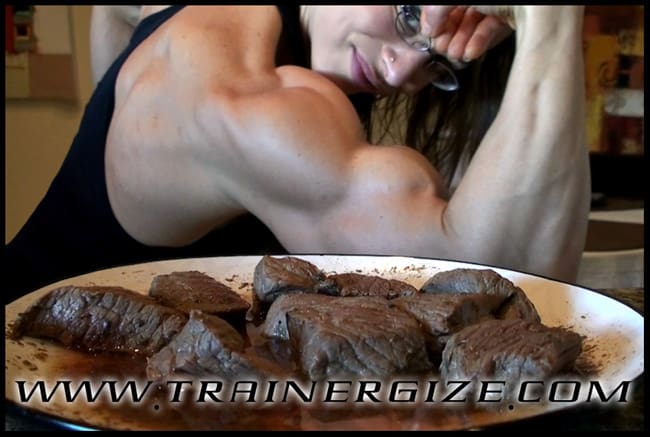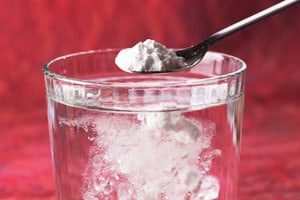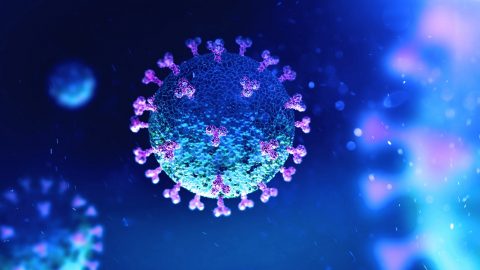Consumption of red meat has been associated with fat gain (and weight gain) because of its high fat / calorie content. Even though the old idea that “a high fat intake causes body fat gain” has been completely debunked in medical research [1-9], red meat still is a food that’s on the forbidden or avoid list in most diet plans. And for some reason, women tend to be especially afraid of eating meat…
While there are studies showing an association between meat intake and obesity [10-12], there are also studies not showing this [12-14]. And when digging deeper in the data, many of the studies that did report a significant association with meat intake and fat gain / obesity have several flaws that invalidate their conclusions….
Meat consumption and long term weight change
One of the latest and largest studies to date on the topic of red meat intake and weight gain (which is a surrogate measure for fat gain in epidemiological studies), concluded [15]:
“Total meat consumption was positively associated with weight gain in men and women, in normal-weight and overweight subjects, and in smokers and nonsmokers. With adjustment for estimated energy intake, meat intake of 250 g/d (e.g. one steak at approximately 450 kcal) would lead to a 2 kg higher weight gain after 5 years compared to the same diet with less meat. Positive associations were observed for red meat, poultry, and processed meat”.
This is a pretty bold statement! However a closer look at the study methodology and data reveals major weaknesses:
First; usual dietary intake was assessed only at baseline and not during the subsequent years. It is well recognized that peoples’ food habits often change over time. And it doesn’t take a rocket scientist to understand that in order to track changes over time, at least two measurements are required. And the baseline food intake assessment was done with questionnaires, which are infamous for being inaccurate [16-18]. Using a methodology that begs the question “how bad is good enough” will obviously not provide very reliable data [17].
Second; in several centers, participants who consumed more meat actually had less weight gain, whereas those with lower meat consumption had higher weight gain. Despite this, and despite the very large number of participants (about 103,000 men and 270,000 women), the researchers behind this study lumped them all together in the statistical analysis. Also, the assessment of physical activity, which is strongly related to food habits [19], was done via self-administered questionnaires, which do not accurately reflect objective physical activity or fitness data [20, 21]. Therefore, the adjustment for a possible influence of physical activity on the observed weight change in this study doesn’t strengthen its conclusions.
Third; the researchers reported an effect based on a combination of meat sources, but their sub-group analyses indicate that after exclusion of participants with chronic diseases and those likely to misreport energy intake at baseline, the following was found:
– red meat is not the villain in the association of meat intake and weight gain.
– the association with poultry was attenuated.
– processed meats were the strongest predictor of weight gain.
This indicates that processing, or factors associated with consumption of processed foods, are involved in the reported detrimental association between meat intake and weight gain, rather than meat per see.
Fourth; and probably the most important shortcoming is that the observed weight changes may be due to changes in either lean body tissue or fat mass or both [22]. Meat is a high-quality source of protein for building and maintaining lean body mass. Consequently, the noted association between meat intake and weight change may partly be due to gain of lean body mass in participants with high meat intake. It is well known that dietary protein plays a major role in developing and maintaining lean tissue mass in the body during growth in infancy, through adulthood while dieting, and particularly in preventing loss of lean body tissue and sarcopenia in elderly individuals over 50 years of age [23]. The loss of lean body mass is a particular problem in individuals over 60 years of age. In older people, a higher intake of high quality protein, such a red meat, helps to prevent loss of lean body tissue, resulting in better muscle strength, bone density, and physical functioning [24]. Thus, it is interesting that the association between meat intake and weight gain was stronger in participants that were over 45 years of age. An alternative interpretation of this finding is that the weight gain seen with higher intakes of red meat is not fat gain, but lean mass gain. This interpretation of the results is congruent with other studies showing that an increase in protein intake from meat and other sources prevents body fat gain [25, 26], enhances diet induced fat loss [27-30], and help with body weight (fat) control [26, 31].
Thus, studies that don’t measure body composition don’t tell anything about the role of meat for body fat control. Because of all these methodological flaws, the conclusion that “a decrease in meat consumption is recommended for body weight management and improvement of health” is totally misleading!
Lean red meat (beef and veal) compared to white meat (poultry and fish)
White meat contains much less fat than red meat, and also less fat than lean red meat, so intuitively it should be better for fat loss and body fat control than red meat, right?! Not so fast…
In a long-term study, two groups of subjects (including both men and women) were instructed to eat 170 g (6 oz) of lean red meat or white meat per day, 5 to 7 days per week [32]. This dietary change resulted in the following differences among the two groups:
Caloric intake:
Lean red meat eaters: 1828 calories per day
White meat eaters: 1650 calories per day
Total fat intake:
Lean red meat eaters: 29.3 % of total energy
White meat eaters: 26.7 % of total energy
Thus, the lean red meat eaters consumed almost 200 calories (178 calories to be exact) extra per day. No changes in physical activity were reported. However, despite this, after 36 weeks (9 months), there were no differences in body weight between the two groups [32]. Theoretically, since the energy content in 1 lb of body fat is about 3,500 calories, this daily caloric excess of about 48,000 calories (178 x 30 x 9) should have resulted in a fat gain of almost 14 lb (48,060 / 3,500).[33, 34] Even if the 3,500 calorie rule is an overestimation [33-35], an excess of 48,000 calories should be expected to result in at least some body fat gain.
This study, in contrast to the misleading one above, was well conducted and used detailed food log records, which is the gold standard tool for estimating dietary intakes [18, 36]. Thus, because a food contains more fat (and calories) doesn’t necessarily have to mean it will cause fat gain.
Lean beef compared to lean fish or poultry
Another study compared intake of beef with that of lean fish and poultry [37]. Three groups of male subjects each rotated in a crossover design through 3 experimental periods that lasted 26 d each. All the diets were planned to provide 2,800 calories per day, of which 18% came from protein, 53% from carbohydrate, and 30% from fat (polyunsaturated-to-monounsaturated-to-saturated fatty acid ratio: 1.0 : 1.1 : 1.0; 268 mg cholesterol/day; and 29 g fiber/day).
The 3 experimental diets had no differences in food composition with the exception of the protein source tested, which was:
1. lean beef (lean ground beef, exterior round, sirloin tip)
2. skinless chicken and ground turkey
3. fish (pollock, cod, sole, and haddock)
69% of daily proteins came from beef, fish, or poultry, and the remaining was from vegetable sources. This corresponded to about 400-500 g of the respective protein foods.
Body weight was measured every 2 days. Subjects were informed that they had to avoid alcohol consumption and that they should maintain the same activity level throughout the study. They were also asked to consume nothing besides the prepared meals they were given by the food lab. It was found that none of the experimental periods resulted in any body weight differences [37]. That is, on iso-caloric diets (i.e. constant energy intake), the protein source does not affect body weight, meaning that there is nothing inherently bad with red meat for weight control, which is a common misperception. This is supported by other studies [38, 39].
Red meat and dieting
There are conflicting recommendations regarding the appropriateness of red meat versus white meat consumption as part of fat loss diets. An interesting study examined changes in body weight in overweight women who followed an energy restricted diet (500 calories per day less than usual) with lean beef or chicken as the primary protein source, while participating in a fitness walking program. Body weight, body composition (by hydrodensitometry), were measured at baseline and after 12 wk.
The results showed a significant weight loss that was similar between the beef group and the chicken group. Both groups showed significant reductions in body fat percentage, with no significant differences between groups. This study demonstrates that weight loss and fat loss can successfully be accomplished through diet and exercise, regardless of whether the dietary protein source is lean beef or chicken [40].
Summary
Well conducted studies show that red meat can be included in effective fat loss diets, and that there is nothing inherently “bad” with red meat that would cause it to interfere in body fat loss or maintenance. And hey girls, this applies to you as well!
“But doesn’t red meat cause heart disease, diabetes and cancer?” you may be thinking. I covered this in depth in a previous article “Red Meat and Health – have we been blaming the wrong thing?”
As outlined in that article; as long as you don’t overcook your steak, stay away from processed meats, eat your daily veggies, and adjust your carb intake to your physical activity level, you don’t have to fear that your meat intake will harm your health. And now you also know you can enjoy your steak without having to worry it would detrimentally impact your fat loss efforts.
Also, make sure to check out Will’s vid “Red Meat, Muscle Building Magic?”
This rounds up meat from all angles – health, fat loss and muscle growth 🙂
VOILA!
Monica Mollica – www.trainergize.com

References:
1. Willett, W.C., Dietary fat and obesity: an unconvincing relation. Am J Clin Nutr, 1998. 68(6): p. 1149-50.
2. Willett, W.C. and R.L. Leibel, Dietary fat is not a major determinant of body fat. Am J Med, 2002. 113 Suppl 9B: p. 47S-59S.
3. Willett, W.C., Dietary fat plays a major role in obesity: no. Obes Rev, 2002. 3(2): p. 59-68.
4. Bazzano, L.A., et al., Effects of low-carbohydrate and low-fat diets: a randomized trial. Ann Intern Med, 2014. 161(5): p. 309-18.
5. Tay, J., et al., A very low-carbohydrate, low-saturated fat diet for type 2 diabetes management: a randomized trial. Diabetes Care, 2014. 37(11): p. 2909-18.
6. Schwingshackl, L. and G. Hoffmann, Comparison of effects of long-term low-fat vs high-fat diets on blood lipid levels in overweight or obese patients: a systematic review and meta-analysis. J Acad Nutr Diet, 2013. 113(12): p. 1640-61.
7. Hu, T., et al., Effects of low-carbohydrate diets versus low-fat diets on metabolic risk factors: a meta-analysis of randomized controlled clinical trials. Am J Epidemiol, 2012. 176 Suppl 7: p. S44-54.
8. Hite, A.H., V.G. Berkowitz, and K. Berkowitz, Low-carbohydrate diet review: shifting the paradigm. Nutr Clin Pract, 2011. 26(3): p. 300-8.
9. Bueno, N.B., et al., Very-low-carbohydrate ketogenic diet v. low-fat diet for long-term weight loss: a meta-analysis of randomised controlled trials. Br J Nutr, 2013. 110(7): p. 1178-87.
10. Kahn, H.S., et al., Stable behaviors associated with adults’ 10-year change in body mass index and likelihood of gain at the waist. Am J Public Health, 1997. 87(5): p. 747-54.
11. Kahn, H.S., L.M. Tatham, and C.W. Heath, Jr., Contrasting factors associated with abdominal and peripheral weight gain among adult women. Int J Obes Relat Metab Disord, 1997. 21(10): p. 903-11.
12. Rosell, M., et al., Weight gain over 5 years in 21,966 meat-eating, fish-eating, vegetarian, and vegan men and women in EPIC-Oxford. Int J Obes (Lond), 2006. 30(9): p. 1389-96.
13. Parker, D.R., et al., Dietary factors in relation to weight change among men and women from two southeastern New England communities. Int J Obes Relat Metab Disord, 1997. 21(2): p. 103-9.
14. Halkjaer, J., et al., Food and drinking patterns as predictors of 6-year BMI-adjusted changes in waist circumference. Br J Nutr, 2004. 92(4): p. 735-48.
15. Vergnaud, A.C., et al., Meat consumption and prospective weight change in participants of the EPIC-PANACEA study. Am J Clin Nutr, 2010. 92(2): p. 398-407.
16. Brown, D., Do food frequency questionnaires have too many limitations? J Am Diet Assoc, 2006. 106(10): p. 1541-2.
17. Byers, T., Food frequency dietary assessment: how bad is good enough? Am J Epidemiol, 2001. 154(12): p. 1087-8.
18. Kristal, A.R., S.A. Beresford, and D. Lazovich, Assessing change in diet-intervention research. Am J Clin Nutr, 1994. 59(1 Suppl): p. 185S-189S.
19. Gillman, M.W., et al., Relationships of physical activity with dietary behaviors among adults. Prev Med, 2001. 32(3): p. 295-301.
20. Aadahl, M., et al., Self-reported physical activity compared with maximal oxygen uptake in adults. Eur J Cardiovasc Prev Rehabil, 2007. 14(3): p. 422-8.
21. Tudor-Locke, C.E. and A.M. Myers, Challenges and opportunities for measuring physical activity in sedentary adults. Sports Med, 2001. 31(2): p. 91-100.
22. Newman, A.B., et al., Weight change and the conservation of lean mass in old age: the Health, Aging and Body Composition Study. Am J Clin Nutr, 2005. 82(4): p. 872-8; quiz 915-6.
23. Paddon-Jones, D., et al., Role of dietary protein in the sarcopenia of aging. Am J Clin Nutr, 2008. 87(5): p. 1562S-1566S.
24. Campbell, W.W., et al., The recommended dietary allowance for protein may not be adequate for older people to maintain skeletal muscle. J Gerontol A Biol Sci Med Sci, 2001. 56(6): p. M373-80.
25. Larsen, T.M., et al., The Diet, Obesity and Genes (Diogenes) Dietary Study in eight European countries – a comprehensive design for long-term intervention. Obes Rev, 2010. 11(1): p. 76-91.
26. Clifton, P.M., J.B. Keogh, and M. Noakes, Long-term effects of a high-protein weight-loss diet. Am J Clin Nutr, 2008. 87(1): p. 23-9.
27. Devkota, S. and D.K. Layman, Protein metabolic roles in treatment of obesity. Curr Opin Clin Nutr Metab Care, 2010. 13(4): p. 403-7.
28. Layman, D.K., Protein quantity and quality at levels above the RDA improves adult weight loss. J Am Coll Nutr, 2004. 23(6 Suppl): p. 631S-636S.
29. Layman, D.K., et al., Dietary protein and exercise have additive effects on body composition during weight loss in adult women. J Nutr, 2005. 135(8): p. 1903-10.
30. Layman, D.K., et al., A reduced ratio of dietary carbohydrate to protein improves body composition and blood lipid profiles during weight loss in adult women. J Nutr, 2003. 133(2): p. 411-7.
31. Paddon-Jones, D., et al., Protein, weight management, and satiety. Am J Clin Nutr, 2008. 87(5): p. 1558S-1561S.
32. Davidson, M.H., et al., Comparison of the effects of lean red meat vs lean white meat on serum lipid levels among free-living persons with hypercholesterolemia: a long-term, randomized clinical trial. Arch Intern Med, 1999. 159(12): p. 1331-8.
33. Thomas, D.M., et al., Can a weight loss of one pound a week be achieved with a 3500-kcal deficit? Commentary on a commonly accepted rule. Int J Obes (Lond), 2013. 37(12): p. 1611-3.
34. Hall, K.D., What is the required energy deficit per unit weight loss? Int J Obes (Lond), 2008. 32(3): p. 573-6.
35. Hall, K.D. and C.C. Chow, Why is the 3500 kcal per pound weight loss rule wrong? Int J Obes (Lond), 2013. 37(12): p. 1614.
36. Thompson, F.E. and T. Byers, Dietary assessment resource manual. J Nutr, 1994. 124(11 Suppl): p. 2245S-2317S.
37. Beauchesne-Rondeau, E., et al., Plasma lipids and lipoproteins in hypercholesterolemic men fed a lipid-lowering diet containing lean beef, lean fish, or poultry. Am J Clin Nutr, 2003. 77(3): p. 587-93.
38. Roussell, M.A., et al., Beef in an Optimal Lean Diet study: effects on lipids, lipoproteins, and apolipoproteins. Am J Clin Nutr, 2012. 95(1): p. 9-16.
39. Hunninghake, D.B., et al., Incorporation of lean red meat into a National Cholesterol Education Program Step I diet: a long-term, randomized clinical trial in free-living persons with hypercholesterolemia. J Am Coll Nutr, 2000. 19(3): p. 351-60.
40. Melanson, K., et al., Weight loss and total lipid profile changes in overweight women consuming beef or chicken as the primary protein source. Nutrition, 2003. 19(5): p. 409-14.







So great to have a “bro” here in the gym with us, who’s also a ——g genious! True to form with the Brinks method of cut the BS, listen to some common sense, and oh by the way, massive scientific research backs it up. Love your work Monica.
Thanks 🙂
I’m glad you appreciate my passion for scientific research and its practical “real life” implications.
Monica, you’re a friggen hero – fact.
Keep em coming.
S.
Rest assured I will 🙂
Red meat is generally considered to be high in fat and not good for health. Lean beef meat is a better option for meat lovers.
?
Lean beef meat is red meat.
Did you take the time to actually read the article? Red meat is red meat, some cuts are higher in fat, some lower, all = red meat.
GREAT article.. i especially like the data from several comparative experiments..
Thanks BZ
While I do enjoy reading a lot; this very conclusive article did run in to my working out at the gym, studying for a test, and getting chores done so that my mother doesn’t get piss-off. I don’t mean to be a bother, but I never did get to the conclusion, and or meaning of the article. (Dose Red Meat Make You Fat?)
Please don’t get me wrong. I’ve unsubscribe to all most every email subscription post that I had subscribed to because; they took up too much reading and study time. However; your articles I trust to be the very best, and I’ve ordered from some of the web-sites that you’ve indorsed. And; because your articles have no come-ons or B. S., I consider myself luck to be on your email list.
My Complaint is: I didn’t get to the conclusion of (Dose Read Meat Make You Fat?).
My Suggestion: A conclusive paragraph at the end of the article. That would such a help.
Ed. Bottom of the article under “Bottom line”
“For all meat lovers, these are good news; whether your goal is to pack on muscle or get in shape, you can enjoy your steak without worrying.”
That seems a simple conclusive statement as it gets for those without the time or interest to get into the details no?
M
Can you make any comments regarding possible advantages (or not) of GRASS FED lean beef vs CORN FED?
Love all of your articles. I also eat lean, grass fed, red meat and wonder if it is worth the extra cost and difference in taste
Jim
Yes, grass fed cattle has a healthier fatty acids profile: more omega-3 and less omega-6, and are also leaner.
Grassfed beef = greatness.
I wonder if red meat has more vit B12 than chicken? Vegan diets are not intrinsically healthy because of the lack of B12.
Pastured chickens are supposed to be the moral and nutritional analog of grass-fed beef. I find it easy to find grass fed beef but not so with pastured chickens.
Will has scored a coup with Monica, what a great resource she is. More than pulls her weight, which makes sense if you look at her photos.
Yes:
100 g cooked chicken breast = 0.2 mcg B12 (4% of minimum daily requirement)
100 g cooked beef = 1.6 mcg B12 (27% of minimum daily requirement)
Red meat also contains more choline and betaine (100 mg/100 g and 13mg/100g respectively) than chicken
(78 mg/100g and 6 mg/100g)).
Note that vegan diets are not intrinsically healthy for more reasons than just the lack of B12. This is a topic that deserves an article in its own right. Vegans and vegetarians are known for being health conscious and living healthy life styles, so there are a myriad of confounding factors hiding behind the data showing that these diets lead to longer and healthier lives.
Thanks for the compliment 🙂
I avoid meat for the following reasons:
1. The harm inflicted on the animals
2. health reasons
3. The harm inflicted on the planet by factory farming.
Also, I am a vegan BB:)
I will not argue about animal rights, that is an ethical issues subject to personal bias, for which there is no right or wrong. When it comes environmental consequences of food production technology, I believe humankind is smart enough and with ingenuity will find solutions. Car use has a far greater detrimental effect on the health of both the planet and its inhabitants….!
When it comes to health issues, I do not agree that eating red meat (or white meat) has inherent negative health effects. I will cover this in-depth in my next article “Red Meat and Health – have we been blaming the wrong thing?” that I will publish here on the BZ soon.
Just something to think about.
First off all , entirely respect your thoughts on not eating meat.
But here’s the thing.
If it wasn’t for meat eaters , it would barely be worth a farmers time keeping dairy stock (cows) nowadays.
Especially in the UK, the price supermarkets pay for milk is so low on the litre, farmers make the backend money on the beef.
Take away the beef and you would pretty much see huge swatches of cows die out in viable farming.
Same for Ostrich, and even more so for pigs and to a lesser extent chickens.
It’s quite possible we wouldn’t really have these animals any more going forward.
So really (and this is partially tongue in cheek) without us evil meat eaters, the planet would lose some amazing animals.
Well, you know, I’ve read all of these statistics about how it takes a swimming pool of fresh water to make a pound of beef, and that doesn’t include all of the gas and water needed to grow the corn to feed the cows, and then consider all of the methane from the cow farts contributing to global warming, manure run-off into the watersheds, and also consider that we simply don’t have enough natural resources to sustainably support the 7 billion people on this planet in a modern, resource hungry, industrialized society.
The solution is simple. Cannibalism. With this obesity epidemic we’d have some nice fatty cuts of meat and we could cull the population of those who cost society the most in health care dollars. Solves a whole bunch of problems all at once.
I personally like beef, I have a quarter of a grass fed beef in my chest freezer and another quarter grazing in a pasture a hundred miles away. There certainly are sustainable ways to produce meat and some day I’d like to try the lab grown meat that researchers are working on.
LOL, Cannibalism. I have it on good authority does not taste like chicken! 🙂
Monica,
I’m so glad you are going to do a follow up to the question of how healthy meat is on heart disease or cancer. All the while, reading your article I kept hoping you would address this question. I can’t wait to read the follow up. I can relax knowing that I eat only eye round of beef, if only because the fattier cuts just don’t agree with me. As for the veggies, someone asked me recently “how many bags of broccoli and cauliflower do you eat at day” and I was proud to say at least two or three. 🙂
I was afraid that beef, even a lean cut of eye-round would contribute negatively to colon cancer or arterio/atherosclerosis, and/or plaque build up? I also eat three or four tablespoons of fish oil a day with my meals, and only whole wheat or oatmeal.
But I will admit that sometimes I will have a bowl of ice cream with my wife, who says; “who are you and what have you done with my husband?” 😉
Even my doctor has said “You know, it wouldn’t kill you to eat a cheeseburger once in a while”, and I reply
“UNACCEPTABLE!” XD
Thanks again for all the great info and articles. Oh and BTW Will, you rock!!!
Yes, the health aspects (other than fat loss/gain) surrounding red meat are important issues. That’s why my follow up article is some 7 pages (excluding references!); it’s more like a book chapter than an article, lol. But I will offer a printer-friendly download link. You will for sure get all your answers there. 🙂
Keep taking your fish oil and munching down the veggie bags, and going to gym, and you have nothing to worry about. When it comes to the ice-cream and cheeseburger, have a look at my article “Cheating on a diet – good or bad?”:
http://www.brinkzone.com/articles/cheating-on-a-diet-good-or-bad/
Hey, take your wife out to a nice steak dinner and maybe she will forgive me…wink! 🙂
Monica,
Awesome! Can’t wait for the article! I will take my wife out for dinner, but her steak will have to be made of soy since she is a vegetarian. 😉
I also wish sometimes I didn’t have to eat meat for muscle growth (if only the animals were treated a bit more humanely at the farms) ;( but unfortunately it doesn’t work that way, and as you’ve pointed out the many benefits of being a carnivore….I will just say a prayer for them in private. 😉
If she’s a vegetarian for health reasons maybe she will change her mind after having read my meat-health article.
As for the animals, evolution is about to eat or get eaten…
First, Monica, I LOVE that photo! And, that plateful of steak just made me hungry! What a marvelous article this is! Red meat has been demonized for way too long, as a source of bad health, in general, and I’ve grown really sick and tired hearing about it. I’ve read other articles besides yours that put the blame squarely where it should be, on processed foods, processed sugar and carbohydrates. These are the sources, primarily, from what I gleaned from the articles, that raise cholesterol levels and put plaque in arteries…not read meat! I believe cancer could be associated with these types of foods, as well. In addition, getting a proper amount of dietary fiber will definitely help one avoid things like colo-rectal cancer, I believe. One last thing: whenever I read so-called “evidence” about things, such as demonizing red meat, I remember a saying I once heard: “research the researchers”, meaning, they just might have a vested interest and investment in something other than solid research!
What you said is right on; it is processed foods and carbohydrates that cause most of the metabolic diseases that majority of the general population is suffering from today.
And yes, there are different qualities of “evidence”. It takes deeper digging beyond the headlines and misleading conclusions to find find the true “facts”…
Oh, and thank you for the compliment 🙂
You are most welcome! You’ve become an inspiration to many of us!
Aww, thank you! 🙂
I actually don’t think that red meat is bad. If it is not very fat, than why not? At least beef steaks that are cooked without oil can be a really good option I suppose.
I lost 11 kilos on dr simeons diet, and after I started to eat healthy, but still I often eat red meat, and I did not gain back my kilos 🙂